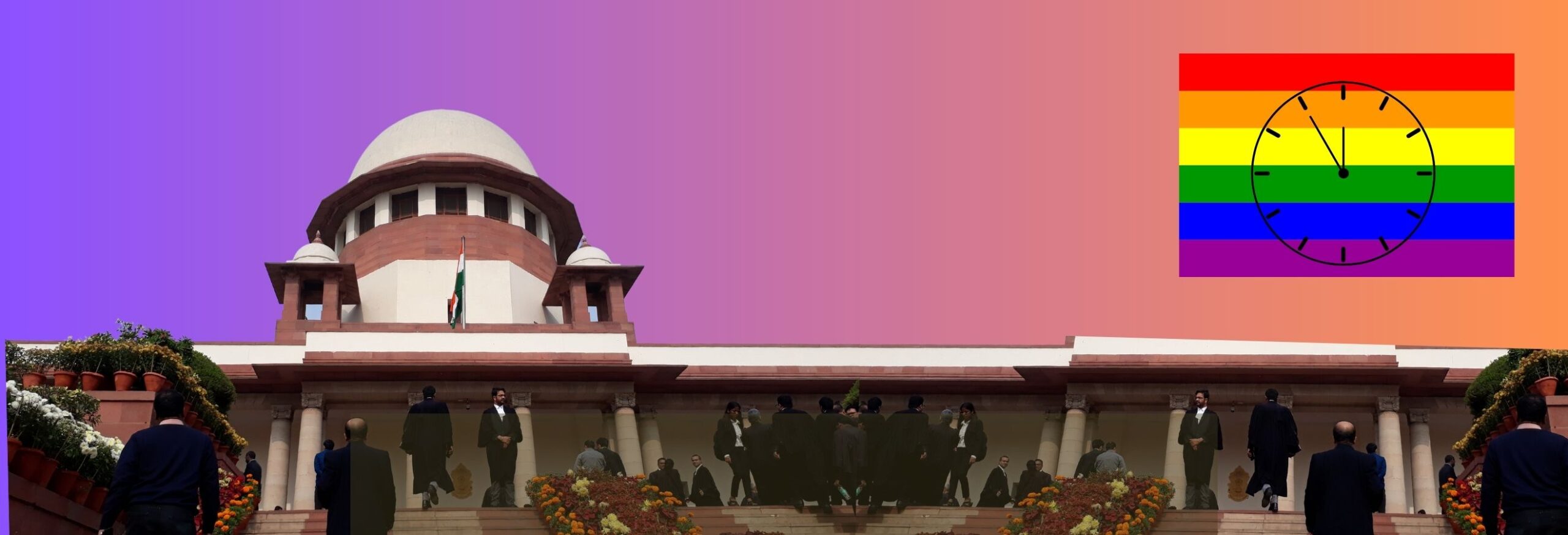Court Data
Arguments Time Split: Plea for Marriage Equality
The Bench heard arguments for nearly 30 hours over 10 days. Three senior lawyers argued for over half the total time.

On day 2 of the marriage equality hearings, the Bench was faced with a deluge of concerned petitioners seeking time to argue. Reassuringly, Chief Justice D.Y. Chandrachud responded, ‘We’re not the sorts who will say that “look now we’re going to close shop, please go away”’. Justice S.K. Kaul, jokingly said that ‘the Chief is far more liberal in giving time…therefore I’m trying to assist the Chief Justice on this Bench.’ He was quick to instruct all parties to ‘ adhere to a limited period of time and stick to the point.’
The SC heard arguments for 10 days between April 18th and May 11th, 2023. Before the hearings began, the Bench instructed the arguing counsels to limit the amount of time they would argue for. The petitioners initially requested 33 hours to make their submissions while the respondents asked for 36 hours*. The Bench slashed this time significantly and finished hearing arguments from both sides in less than 30 hours.
Figure 1 shows that Senior Advocates Dr. A.M. Singhvi and Mukul Rohatgi argued for the lion’s share of the time allotted to the petitioners. Out of over 18 hours of petitioners’ arguments, the two Senior Advocates argued for 9.51 hours (53% of the petitioners’ time). The remaining petitioner advocates argued for 42.5 minutes on average. Among them, only Sr. Adv.s K.V. Vishwanathan and Menaka Guruswamy argued for over an hour.
A rising demand for marriage equality from the queer community was the driving factor behind this case being heard. The question then arises, how much time to argue was given to the openly queer lawyers involved in this case? Sr. Adv.s Menaka Guruswamy and Saurabh Kirpal, along with Adv.s Arundhati Katju and Amritananda Chakravorthy comprise this group. They collectively argued for 2.86 hours (15.89% of the petitioners’ allotted time). The Bench clearly stated they would brook no repetition of arguments from any of the counsels following Dr. Singhvi and Mr. Rohatgi. The remaining advocates were to only present points not covered by the two.
Does the time-split for the respondents’ arguments present a similar picture?
In Figure 2, we can see that the respondents only argued for 11 hours and 48 minutes in total. Roughly 6 fewer hours compared to the petitioners, despite more advocates arguing for the respondents (even excluding multiple advocates who argued for a minute or less). In large part, this is because 9 of the 15 respondent lawyers argued for less than 20 minutes. In comparison, only 2 of the 14 petitioner advocates argued for less than 20 minutes.
The time split between lawyers on the respondents’ side is even more stark. Solicitor General Tushar Mehta, for the Union, argued for over 6.5 hours. The average time taken by the remaining respondent advocates is 26.5 minutes. Sr. Adv. Kapil Sibal**, the runner-up, argued for slightly over an hour and a half (93.5 mins).
Overall, three senior counsel argued for 50.7% of the total time (29.81 hours) in which arguments were heard at the SC. Mr. Mehta, Dr. Singhvi and Mr. Rohatgi argued for 15.13 hours through the course of the hearings.
On day 2 of the hearings, CJI Chandrachud made it clear that 1-2 lawyers from each side would take point and make the lion’s share of the arguments. Other counsels would then limit themselves to supplementing the arguments made without any repetition. From the data we can glean that this methodology played out exactly as intended by the Supreme Court.
*The initial requests for argument time from both the petitioners and respondents were made when the personal law challenge still stood. On the first day of hearings, the case was restricted to the challenge to the Special Marriage Act, 1954.
**Sr. Adv. Kapil Sibal was initially supposed to represent Jamiat-Ulama-I-Hind. However, since personal law was excluded from the ambit of the case, he did not appear in his capacity as counsel for Jamiat. Instead, he was asked to ‘assist’ the Court.